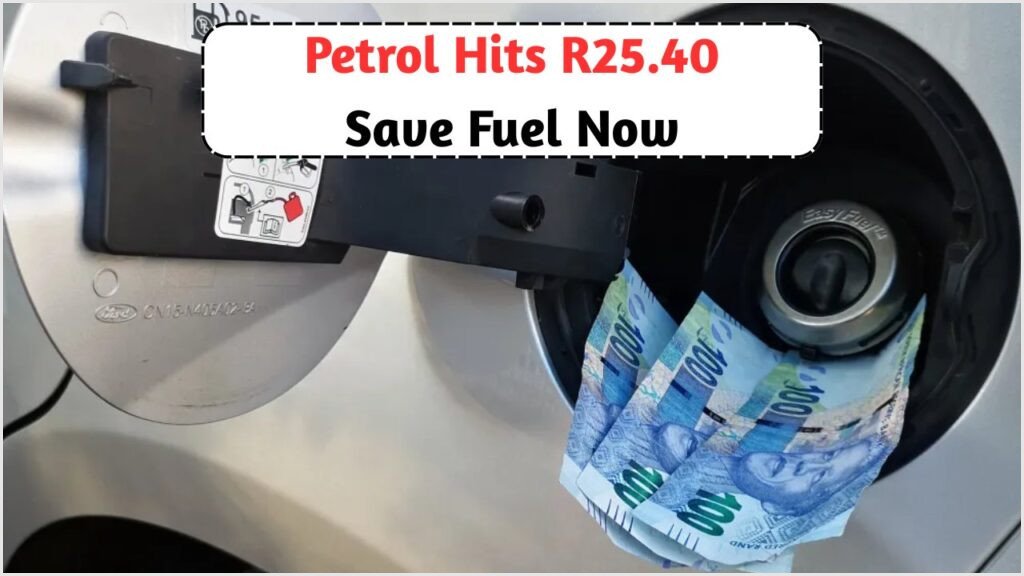Gauteng fuel prices at a record high: South Africa’s economic hub, Gauteng, is grappling with unprecedented fuel prices, sending shockwaves through households and businesses alike. With this significant surge, residents are feeling the pinch at the pump, and the ripple effect is being felt across various sectors. As the heart of the nation’s industry and commerce, Gauteng’s fuel price hike is not just a regional concern but a national one. It’s crucial for residents to explore innovative ways to save on fuel costs and adapt to this challenging scenario. From carpooling to exploring alternative modes of transportation, there are multiple strategies one can employ to mitigate the impact of these soaring prices.
Understanding the Surge in Gauteng Fuel Prices
The current spike in Gauteng’s fuel prices can be attributed to a combination of international and local factors. Globally, oil prices have been on an upward trajectory due to geopolitical tensions and supply chain disruptions. Locally, the weakening of the Rand against major currencies has further exacerbated the situation, leading to higher import costs for crude oil. Additionally, government levies and taxes on fuel have steadily increased over the years, adding to the overall price burden. As a result, motorists in Gauteng are now paying more than ever for fuel, raising concerns about affordability and sustainability.
 Discover the Fastest Way to Unlock NSFAS Funds: Thousands Swear by This Proven Appeal Format!
Discover the Fastest Way to Unlock NSFAS Funds: Thousands Swear by This Proven Appeal Format!
- Geopolitical tensions affecting oil supply
- Weakening Rand increasing import costs
- Annual increase in government levies
- Supply chain disruptions globally
- Inflationary pressures on local economy
Impact on Daily Commuters
| Commuter Type | Fuel Cost Increase | Alternative Options |
|---|---|---|
| Private Car Owners | Up by 20% | Carpooling, Public Transport |
| Taxi Operators | Up by 15% | Route Optimization |
| Bus Companies | Up by 18% | Fuel-efficient Buses |
| Impact on Goods Transportation | Significant Cost Increase | Pricing Adjustments |
Money-Saving Tips Amidst High Fuel Prices
With Gauteng residents facing financial strain due to high fuel prices, adopting cost-saving measures is more critical than ever. One of the most effective strategies is carpooling, which not only reduces individual fuel expenses but also contributes to less traffic congestion. Additionally, utilizing public transport can be a more economical choice for daily commuting. For those who prefer driving, maintaining optimal tire pressure and ensuring regular vehicle servicing can improve fuel efficiency. Planning routes carefully to avoid traffic congestion and using apps to find the cheapest fuel stations can also significantly cut costs.
 August 17, 2025: R1,250 Foster Child Grant Payout Begins – Ensure You Receive Your SMS Alert!
August 17, 2025: R1,250 Foster Child Grant Payout Begins – Ensure You Receive Your SMS Alert!
- Carpool with colleagues or neighbors
- Use public transport for long commutes
- Regular vehicle maintenance for efficiency
- Plan routes to avoid traffic jams
- Utilize apps to find cheap fuel
- Consider cycling for short distances
Exploring Alternative Transportation Options
| Transportation Mode | Benefits |
|---|---|
| Electric Vehicles | Lower long-term costs |
| Bicycles | Eco-friendly and healthy |
| Public Transport | Cost-effective for longer distances |
| Walking | Zero cost and healthy |
| Carpooling | Reduced individual costs |
Long-Term Strategies to Combat High Fuel Prices
While short-term solutions can alleviate the immediate burden of high fuel prices, long-term strategies are essential for sustained relief. Investing in energy-efficient vehicles, such as hybrids or electric cars, can significantly reduce fuel consumption. Moreover, encouraging the use of renewable energy sources and improving public transport infrastructure could contribute to a more resilient and sustainable transportation system. On a policy level, advocating for reduced fuel taxes and exploring subsidies for public transport users can provide much-needed relief to consumers and promote a shift towards more sustainable travel habits.
- Invest in energy-efficient vehicles
- Encourage renewable energy use
- Improve public transport systems
- Advocate for reduced fuel taxes
- Explore subsidies for public transport
Fuel Price Trends in Gauteng
| Year | Average Price per Litre | Percentage Increase |
|---|---|---|
| 2020 | R14.00 | 5% |
| 2021 | R16.00 | 14% |
| 2022 | R18.50 | 16% |
| 2023 | R20.00 | 8% |
| 2024 (Projected) | R22.00 | 10% |
Community Initiatives to Tackle Fuel Price Hikes
Communities across Gauteng are coming together to address the challenges posed by rising fuel prices. Carpooling networks have been established, allowing residents to share rides and reduce individual fuel costs. Additionally, community-driven awareness campaigns are educating people about fuel-saving practices and encouraging the adoption of alternative transport methods. Local governments are also playing a role by enhancing public transport options and investing in infrastructure that supports cycling and walking. Through these collective efforts, communities are finding ways to adapt to the new normal of high fuel prices.
- Carpooling networks
- Awareness campaigns
- Alternative transport promotions
- Enhanced public transport options
FAQs About Gauteng’s Fuel Price Increase
What are the main causes of the fuel price hike in Gauteng?
Global oil price increases, a weakening Rand, and higher government levies are the primary factors driving the price hike.
- Global oil price rises
- Weakening Rand
- Increased government levies
- Supply chain disruptions
How can I save on fuel costs in Gauteng?
Consider carpooling, using public transport, maintaining your vehicle, and planning efficient routes to save on fuel costs.
- Carpooling with neighbors
- Using public transport
- Regular vehicle maintenance
- Route planning to avoid traffic
Are there long-term solutions to high fuel prices?
Investing in energy-efficient vehicles, supporting renewable energy, and improving public transport infrastructure are long-term strategies.
- Energy-efficient vehicle investment
- Renewable energy support
- Public transport improvements
- Policy advocacy for fuel tax reduction
What community initiatives exist to help cope with fuel prices?
Carpooling networks and awareness campaigns
Support for cycling and walking initiatives
Public transport enhancements
Local government infrastructure investments
Community collaboration for resource sharing




